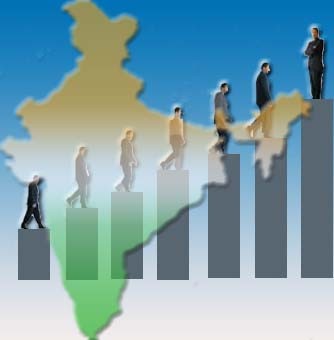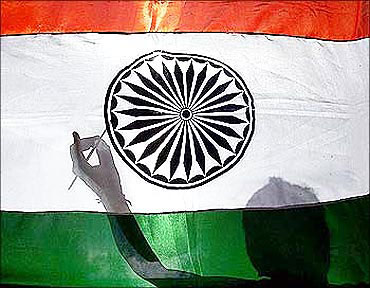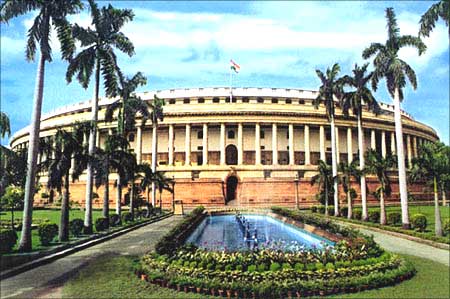Rajesh Rai & Nishikant Dwivedi in New Delhi
Emerging from the grip of a crippling recession, world trade is set to surge by 13.5 per cent in 2010, with a resurgent India contributing over half a trillion dollars to global commerce for the first time in history.
With global trade coming out of a 'painful economic recession' in 2009, India's merchandise engagement with the world -- both imports and exports -- picked up pace in the 2010-11 fiscal after a rather lacklustre performance in the previous year.
The value of India's inbound and outbound trade in goods is set to touch $550 billion in the 2010-11 fiscal, with imports expected to touch $350 billion, as against $288 billion in the 2009-10 fiscal.
. . .
India's global trade set to cross $500 billion
"Following a faster-than-expected recovery in global trade flows so far in 2010, WTO economists have revised their projection for world trade growth in 2010 upward to 13.5 per cent," a WTO report said.
Making out a strong case against protectionism, World Trade Organisation Director General Pascal Lamy said: "This surge in trade flows provides the means to climb out of this painful economic recession and can help put people back to work. It underscores, as well, the wisdom governments have shown in rejecting protectionism."
India stood out among other countries during the year in terms of its open trade policies, as is evident from the huge trade deficit of $120-130 billion projected for the current financial year.
. . .
India's global trade set to cross $500 billion
The restrictive trade policies adopted by India's larger neighbour, China, stood out in sharp contrast.
The past year witnessed an escalating currency war between the US and China, with Washington urging Beijing to allow the yuan to rise, claiming that the Chinese currency was artificially depressed in order to create an unfair trade advantage.
However, the US has been accused of doing the same thing, following an announcement in November that the Federal Reserve will purchase Treasury Securities to infuse $600 billion into the struggling economy by June, 2011.
This would be achieved by printing more dollar bills, thereby lowering the value of the currency.
. . .
India's global trade set to cross $500 billion
What is more, the US has taken an increasingly protectionist stance against outsourcing to countries like India, with the state of Ohio imposing a ban on state departments awarding work orders to overseas IT companies.
Furthermore, a controversial legislation to beef up security along the US-Mexico border by hiking the cost of visas sought after by overseas professionals also attracted criticism.
In sync with the pace of growth of their economies, developing countries are expected to perform better than developed nations in terms of trade in 2010, with China at the head of the table with a 36.3 per cent expansion in trade.
. . .
India's global trade set to cross $500 billion
The total trade of Asia's powerhouse had already surged to $2.68 trillion in the first 11 months of 2010.
Its trade surplus, mainly with the US, but also with Asian countries like India, remained a big area of concern for economists, central bankers and policy makers.
While India has conveyed its concerns to China about the trade imbalance and refused to enter into a free trade agreement with it, countries like the US were more aggressive in charging Beijing with indulging in currency manipulation to the advantage of its exporters.
. . .
India's global trade set to cross $500 billion
The US-China Economic and Security Review Commission's 2010 Annual Report to Congress recommended that the US respond to China's currency undervaluation by working with America's trading partners to invoke the enforcement provisions of all relevant international institutions and using the unilateral tools available to the US government to encourage China to help correct global imbalances.
In the absence of progress on the much-delayed Doha talks for opening up world trade, major economies across the globe have increased their focus on bilateral or within-blocs commerce and investment-opening pacts.
. . .
India's global trade set to cross $500 billion
India, on its part, implemented free trade pacts with South Korea and 10 South-East Asian Nations during 2010.
In addition, negotiations on free trade agreements with other countries gathered momentum in 2010.
India has already finalised trade pacts with Malaysia and Japan and is in advanced stages of concluding a Broad-Based Investment and Trade Agreement with the 27-nation European Union.
While the Doha Round of talks launched in 2001 for a global trade deal are yet to make any headway, the year 2011 could be 'a critical window of opportunity'.
. . .
India's global trade set to cross $500 billion
At the G20 Summit in Seoul in November, the leaders of developed and fast-growing developing nations, including Prime Minister Manmohan Singh, threw their weight behind the Doha talks and asked negotiators to intensify their efforts to finalise the multilateral pact by 2011.
The G20 leaders made clear their '... strong commitment to direct our negotiators to engage in across-the-board negotiations to promptly bring the the Doha Development Round to a successful, ambitious, comprehensive and balanced conclusion...,' in a declaration after the Summit.









article